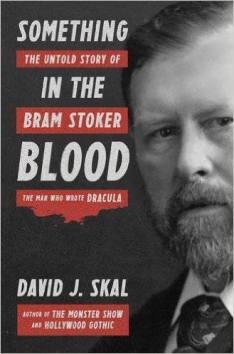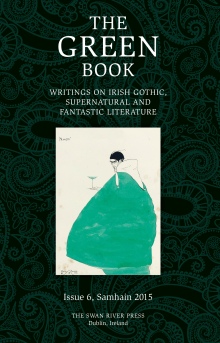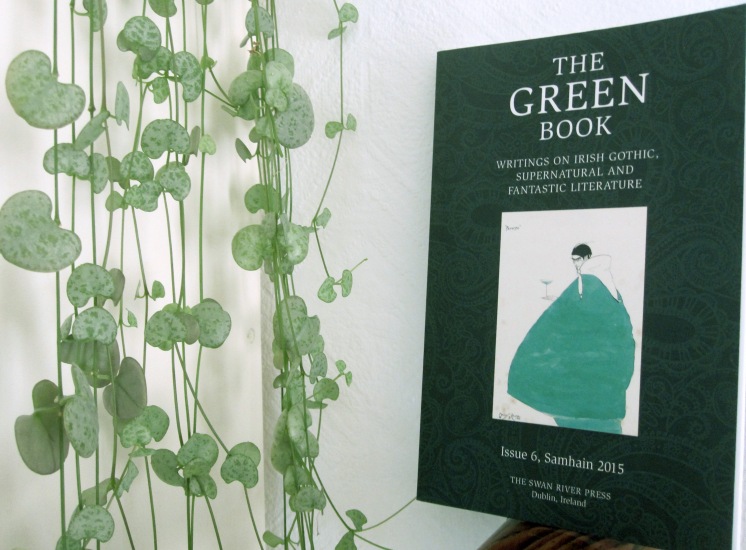So far The Green Book has been avoiding Mr. Bram Stoker. Not out of dislike or animosity, but for a journal that hopes to illuminate the lesser seen corners of Irish fantastic literature, I felt it was okay to let Stoker—our most prominent spokesman—wait patiently in the wings for the first few issues and allow others the spotlight for just a moment. But now that we’re six numbers in, it’s time to give Mr. Stoker his due and allow him to take centre stage. And so we pull back the red velvet curtains on this issue in grand style.
It’s not every day one discovers a forgotten story by Bram Stoker. But there it was, on page three of an equally forgotten daily newspaper. It appeared quite unexpectedly in the far right-hand column. There’s nothing quite like that rush of excitement one feels when making such a discovery in the otherwise subdued and dimly-lit microfilm room of the National Library. The thrill of reading that recognisable prose, filled with masculinity, adventurous seafaring, nefarious murder, teetotalling, a clever fiancée, and a ghost. Did I not mention it’s a ghost story too? It is, and also the second (known) story Stoker had ever published. No, it’s not every day that one discovers a forgotten story by Bram Stoker. But they’re out there, just waiting to be uncovered. And we’re happy to be able to share this one, which has lain dormant for nearly 150 years, with you.
 We’re equally fortunate to have in this issue an introduction from David J. Skal giving some background and context to Stoker’s lost tale. As some of you may already know, Skal’s new biography of Stoker, Something in the Blood, will be out next year; certainly an event keenly anticipated by many. At the end of this issue, John Edgar Browning, himself no stranger to unearthing forgotten writings by Stoker, interviews Skal about Dracula, Stoker, and his forthcoming book.
We’re equally fortunate to have in this issue an introduction from David J. Skal giving some background and context to Stoker’s lost tale. As some of you may already know, Skal’s new biography of Stoker, Something in the Blood, will be out next year; certainly an event keenly anticipated by many. At the end of this issue, John Edgar Browning, himself no stranger to unearthing forgotten writings by Stoker, interviews Skal about Dracula, Stoker, and his forthcoming book.
So what’s in between this Stoker sandwich? Glad you asked. We’ve got an excellent essay on Lafcadio Hearn’s Irish influences from John Moran (to coincide with the Hearn exhibition running this autumn at the Little Museum of Dublin), a short reminiscence of the Great War by Lord Dunsany, a piece by Martin Hayes on the fraught relationship between Yeats and Crowley (hey, we’ve got to mark the Great Poet’s sesquicentenary somehow, right?), and finally an essay on the oddly overlooked mystic, visionary, poet, artist, pacifist, and statesman George William Russell (AE)—rightly described by Archbishop Gregg as “that myriad-minded man”—who I hope you will find as interesting as I do. In addition to all this, we have our usual crop of reviews, from which I hope you’ll find something to discover.
 Finally, before I leave you in the capable hands of Mr. Stoker, I would like to direct your attention to the cover. Here you will find Harry Clarke’s “Mephisto” (1914) from Goethe’s Faust. Stoker’s employer, the celebrated actor-manager Sir Henry Irving, played Mephistopheles with great success throughout his career. It is a role Stoker saw him perform over seven hundred times. The infernal character, as portrayed by Irving, is thought to have influenced Dracula—but the astute reader will catch Stoker’s much earlier reference to Mephistopheles in the pages ahead.
Finally, before I leave you in the capable hands of Mr. Stoker, I would like to direct your attention to the cover. Here you will find Harry Clarke’s “Mephisto” (1914) from Goethe’s Faust. Stoker’s employer, the celebrated actor-manager Sir Henry Irving, played Mephistopheles with great success throughout his career. It is a role Stoker saw him perform over seven hundred times. The infernal character, as portrayed by Irving, is thought to have influenced Dracula—but the astute reader will catch Stoker’s much earlier reference to Mephistopheles in the pages ahead.
And now, without further ado, ladies and gentlemen, I am pleased to present to you, Mr. Bram Stoker’s “Saved by a Ghost” . . .
Brian J. Showers
Rathmines, Dublin
16 August 2015
Order The Green Book 6 here.
Contents
“Editor’s Note”
Brian J. Showers
“Saved by a Ghost”
Bram Stoker
“Some Comments on ‘Saved by a Ghost'”
by David J. Skal
“Early Influences on Lafcadio Hearn”
John Moran
“Stray Memories”
Lord Dunsany
“Fry-Ups with the Poets and Prophets”
Martin Hayes
“AE: Mystic and Economist”
Ernest A. Boyd
“Something in His Blood: An Interview with David J. Skal”
John Edgar Browning
“Reviews”
Mervyn Wall’s The Unfortunate/Return of Fursey (Darrell Schweitzer)
Craftsman Audio’s Complete Ghost Stories of Le Fanu (Rob Brown)
Caitriona Lally’s Eggshells (John Howard)
Ivan Kavanagh’s The Canal (Bernice M. Murphy)
“Notes on Contributors”


